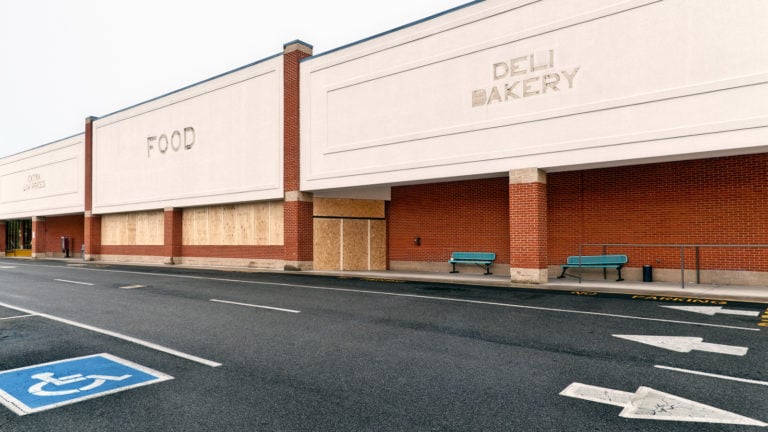The real estate sector is one of the duds in the S&P 500. This is highlighted by a year-to-date decline of almost 9% for the widely followed MSCI US Investable Market Real Estate 25/50 Index, confirming the struggle is real for real estate investment trusts (REITs).
Making the performance of the broader REIT universe all the more disappointing this year is that the asset class typically delivers for investors when interest rates are low and that’s exactly the scenario we’re in today with the Federal Reserve taking rates to historic lows because of the novel coronavirus pandemic.
For the most part, that trend isn’t living up to billing in 2020. The pandemic is punishing an array of REITs, including corporate office, hotels and mall/brick-and-mortar real estate names. With e-commerce altering the retail landscape and store closures and retail bankruptcies poised to eclipse records this year, retail REITs are among the most vulnerable in this group.
Another reason investors should tread carefully with real estate stocks is that there are some financially flimsy outfits here. Thirty-five REITs residing in the Russell 3000 Index have interest coverage ratios below 1, meaning the debt interest these companies contend with outstrips earnings.
With those ominous factors in mind, here’s a trio of REITs to avoid over the near term.
Saul Centers (BFS)

Saul Centers, a retail REIT, has a couple traits that are sure to tempt some investors. First, the stock is up 16.74% over the past month. Second, it yields almost 7%, which is a king’s ransom in today’s low-yield climate.
Additionally, this is a small-cap stock and smaller equities are recently resurgent and the bulk of the company’s properties are in the economically vibrant metropolitan Washington, D.C./Baltimore area.
Saul’s area of emphasis is shopping centers and mixed-use properties, though it owns other holdings. The good news is many of those venues are anchored by grocery or home improvement stores, pharmacies or banks, also known as essential businesses. Still, rent collection across its portfolio was 81% in the second quarter. Better percentages can be found elsewhere in the REIT universe.
In the third quarter, Saul’s funds from operations (FFO) – a critical metric for valuing REITs and assessing financial strength – declined to $22.5 million from $24.1 million a year earlier. That doesn’t mean Saul is a weak company, but there are novel coronavirus headwinds here investors shouldn’t overlook. The company acknowledges as much, noting many of its tenants operating non-essential businesses are dealing with temporary closures, prompting requests for adjustments to lease terms.
Saul Centers has $40.6 million in cash and can borrow up to $200.3 million if so needed so its balance sheet is decent, but investors looking to embrace REITs would do well to consider those managing properties without so much exposure to Covid-19 closure trends.
Retail Value (RVI)

Retail Value has a lot in common with its aforementioned peer Saul Centers. RVI stock is a small-cap stock with a double-digit gain over the past month and it sports an eye-catching yield of 7.88%. Still, this is a REIT that’s down 60% year-to-date and there are dividend issues to consider.
Earlier this year, Retail Value paid its dividend in a mix of cash and stock, a move that occurs in the REIT universe during times of duress. Interestingly, that decision was made in January, before the pandemic would have been a credible source of blame for that move.
However, there is pandemic leverage here. Retail Value collected 72% of its rent in the second quarter, 86% in the July through September period and 84% last month, according to the REIT. Deferral agreements were reached 9% in second quarter and 4% in the following quarter and while all of the numbers mentioned in this paragraph aren’t alarmingly bad, investors can find better ratios in other corners of the REIT space.
In the September quarter, Retail Value’s FFO declined by $8.5 million as the company grappled with lower rental income and higher impairments stemming from, you guessed it, the coronavirus pandemic. Among REITs with retail exposure, the excuse is tedious, but relevant, indicating investors may want to shop elsewhere as case counts spike again.
Summit Hotel Properties (INN)

Summit Hotel Properties is up a torrid 43.48% over the past month, but like its aforementioned peers, INN stock has considerable pandemic exposure and unlike its counterparts highlighted here, the hotel/motel REIT doesn’t pay a cash dividend. It had to suspend the payout earlier this year to conserve cash. A REIT without a cash dividend is usually a turnoff for income investors because without the payout, those investors are dependent on growth in a cyclical sector for profits.
Over the course of the pandemic, analysts voiced concern about the vulnerabilities of hotel REITs, citing a variety of factors, including potential dividend cuts.
“The hotel, mall and diversified REIT segments are all high-risk in light of their leverage positions, low interest coverage, high short interest and the risk of dividend cuts,” S&P Global Market Intelligence reports, citing Compass Point.
To be fair to Summit, it’s kept most of its properties open during the pandemic, reducing its cash burn and its cash position and access to credit confirm the REIT can survive for an extended period if the pandemic takes a dramatic turn for the worse.
Further crimping the INN stock thesis is just how long it’s going to take for travel patterns to approach 2019 levels even after a Covid-19 vaccine is available. Investors looking for leisure REIT exposure, may want to consider gaming REITs over pure hotel equivalents.
On the date of publication, Todd Shriber did not have (either directly or indirectly) any positions in any of the securities mentioned in this article.
Todd Shriber has been an InvestorPlace contributor since 2014.
